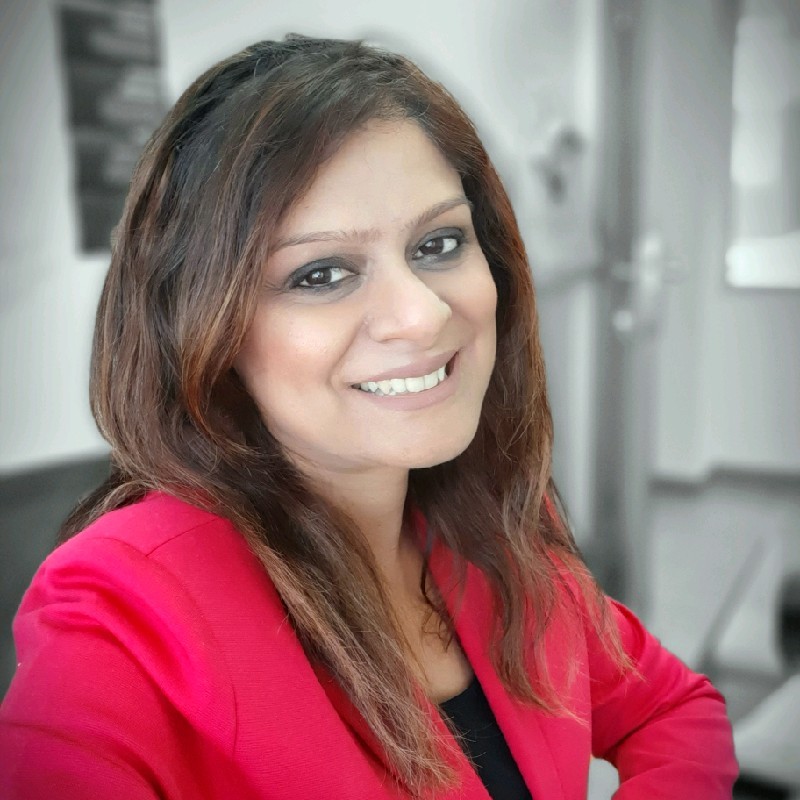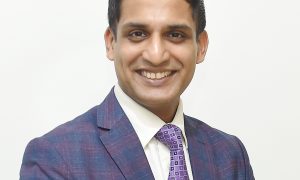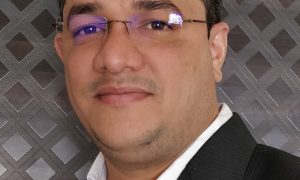This interview has been published by Namrata Singh and The SuperLawyer Team

Heading the IP and Data Protection practice at Galadari Advocates is no small feat. What sparked your interest in this field, and how has your journey been in managing high-profile projects and transactions? Can you share a bit about what drew you to this field and some highlights of your experience so far?”
Heading the Intellectual Property (“IP”) and Data Protection practice at Galadari Advocates has indeed been a remarkable and rewarding journey. Well, I am old school on this, but for sure, it was my father, a techno legal patent attorney in the 80s, who sparked my first interest in the subject. At that time India was still in the process of developing their Intellectual property laws and the landscape was only evolving.
Reading through the files and books and general casual chats with him on various patent and trademark related issues got me curious. Reading through files and commentaries, I found myself drawn to the intricacies of intellectual property law, realizing that it was more than just a legal practice – it was a unique blend of law and business. Furthermore, IP encompasses a broad spectrum of activities including registration, protection and enforcing rights making it a dynamic field.
Dealing with clients from diverse backgrounds, ranging from multinational corporations to small and medium enterprises, has broadened my perspective and it is interesting to see the different dynamics between clients as their priorities towards their brand protection might be different and so would be their funding. An example for the same would be how, more often than not, high profile clients implement a proactive step towards protecting their IP whereas smaller clients implement a reactive approach, only when their rights have been violated. This is however shifting, with people getting more aware about the importance of protecting their IP.
Each project is made special by the personal touches of sitting down with clients, learning about their business, and developing methods to protect what is essential to their brand. This sector is rewarding and demanding due to its unique blend of legal expertise and commercial considerations.
With over 19 years of experience, including 17 in the Middle East, how have you seen the landscape of IP and Data Protection evolve in the region, and what trends do you anticipate in the coming years?
Over the past 17+ years of navigating the IP and Data Protection landscape in the Middle East, I’ve seen a whirlwind of changes that truly reflect the region’s commitment to staying at par with global standards.
One of the most exciting shifts has been the government’s proactive approach. Laws are no longer static; they’re in a constant state of evolution in alignment to the international standards. Signing the Madrid treaty has been one of the very progressive steps UAE IP office has taken.
Amendments in laws and regulations, international treaties, and a more practical stance on handling IP disputes showcase a dynamic and contemporary mindset. For instance, despite not being a common law country, it’s fascinating to note the newfound importance given to prior use in cases involving unregistered trademarks – a bit of a twist from the norm in civil law countries. Additionally, reducing the trademark registration fees, which were once sky-high but have now been dialed down to attract brands, has played a significant role in enticing businesses to set up shop in this first-to-file country.
In the realm of Data Protection, it’s been a journey from virtually no laws to now having our own Personal Data Protection Law (PDPL). I still recall, during the earlier times, we used to rely on DIFC DP law or other privacy laws when we were approached to advise on the DATA P regime of the country.
Nonetheless, today the country has its own law, and we’re eagerly awaiting implementing regulations to solidify the DP framework. Looking ahead, there’s a buzz in the air for Data Protection. Sectors like finance, health, and insurance now have specific DP laws, and businesses of all sizes are gearing up for compliance, especially considering the potential fines. AI and FinTech are particularly two upcoming fields to watch out for in UAE’s legal landscape.
What’s heartening is the growing awareness among individuals of their rights and the relevant laws. With the authorities lending a helping hand through guidance and support, we’re seeing a more significant number of complaints being filed. In a nutshell, it’s been an incredible personal journey witnessing these transformations in the Middle East. It feels like we’re on the cusp of a new era, one where the region not only embraces but thrives in the realms of IP and Data Protection.
As a member of the INTA Leadership Program and a regular speaker at international events, including chairing committees such as the Parallel Import Committee for the Middle East, Africa, and South Asia for INTA, can you share one memorable experience from these engagements? Additionally, what challenges and rewards have you encountered in leading initiatives on such a scale?
Being a part of the INTA Leadership Program and taking on roles such as chairing the Parallel Import Committee for the Middle East, Africa, and South Asia has been an incredibly rewarding experience. The scope wasn’t limited to just the Asia-Pacific region, Africa, and the Middle East; it extended to handling matters in 17 countries. This provided a unique opportunity to navigate the legal landscapes of diverse jurisdictions, each with its own legal backgrounds, cultures, and languages.
The most rewarding aspect was the exposure to such a wide array of legal professionals. Dealing with individuals from different knowledge backgrounds and approaches required flexibility. Instead of trying to change everyone else, the key was adapting to different nuances while staying focused on the end objectives.
One particularly memorable experience involved a case related to parallel imports in Australia. The Parallel Imports Committee at INTA, including myself, worked on creating a white paper analyzing the case and proposing the best solutions. The paper, submitted by the Australian team, was accepted and analyzed, showcasing the tangible impact of our collaborative efforts.
Another notable experience was engaging in policy dialogue with a Southeast Asian government. The goal was to shift from international exhaustion of rights to national exhaustion of rights. Being a part of a different country’s policy-making dialogue was fascinating, especially since I had no prior background in that particular jurisdiction.
However, leading initiatives on such a scale also came with its set of challenges. One challenge involved working with individuals who may not have had the same intentions or commitment to contributing to the committee’s objectives. Identifying those who weren’t actively participating and diplomatically encouraging holistic participation was a balancing act.
On the speaking front, the challenge was managing time effectively. Balancing commitments to billable work, client interactions, and INTA responsibilities required a keen understanding that the time invested in such leadership roles would contribute to the future development of clients and businesses. It was a juggling act, but the rewards of networking, learning, and contributing to the broader legal community made it all worthwhile!
Having worked with diverse teams across the APAC region, what cultural nuances have you found particularly interesting or challenging, and how do you navigate them in a professional setting?
Working with diverse teams in the APAC region, I’ve encountered interesting cultural nuances in decision-making, adaptability, and neutrality. Adapting my leadership style for consensus-building or direct approaches, adjusting communication styles, and maintaining impartiality have been key. Creating an inclusive environment that values diverse perspectives fosters effective collaboration and builds trust within the team.
You pursued additional education at the University of Pennsylvania and WIPO. Can you tell us about the motivations behind these choices and the impact they’ve had on your career? How has this knowledge enhanced your approach to handling data protection issues in the legal realm?
Embarking on additional education at the University of Pennsylvania and WIPO was a pivotal decision in my mid-career journey, driven by a deep-seated belief in the importance of continuous learning. As a lawyer, being the first point of contact for businesses necessitates a deep understanding of evolving legal landscapes to better cater to client needs.
The Middle East is undergoing rapid legal transformations and pursuing these courses was a deliberate effort to evolve as a lawyer in tandem to the ever-evolving legal landscape. It’s not just about knowledge; it’s about providing clients with informed and comprehensive guidance in navigating the intricacies of emerging legal frameworks. Studying the laws of countries that have already progressed helps you understand what to expect in a newer country like the UAE, where laws are still in the making. Understanding the trajectory of legal systems allows me to advise clients effectively, offering insights and strategies honed from the experiences of more developed legal landscapes.
Something that needs to be noted by young legal professionals and aspiring lawyers is that beyond personal growth, expanding your education serves as a strategic move to enhance your marketability. It’s about presenting yourself as a professional committed to continuous improvement. This also instills confidence in clients, knowing they are entrusting their legal matters to someone deeply invested in staying at the forefront of their field.
Balancing roles as Partner and Head of IP and Data Protection, Tech Laws, and Corporate Commercial matters must be demanding. How do you unwind and recharge outside of work?
Balancing my roles in various practice areas of law, can be intense. To unwind, I keep things simple and away from legal stuff. I love hanging out with friends—chatting about all sorts of things outside the legal world. It’s a great way to take a break and see things from different angles.
Movies are my escape. Getting lost in a good story helps me forget about work and just enjoy the moment. I’m also a fan of theatre. Most importantly, I make sure my free time is law-free. Keeping that separation helps me recharge, so when I get back to work, I’m ready to go with a fresh perspective.
Your clients span various industries such as fashion, FMCG, real estate, and automotive. Do you have a favorite or most interesting case that stands out in your career?
I had worked on a trademark cancellation case in the UAE before the Dubai courts a few years back. While the law did provide the grounds for illegal registration to be considered for cancelling the registration of a mark, at that time I was surprised to see that there was hardly any recognition of this aspect and the country’s lawyers and judiciary was only aware of implementing cancellation under non-use provision. Having said that, I maintained my submissions strictly on the basis of illegal registration grounds and drew the judiciary’s attention to the Paris convention articles that clearly lays down this principle. We also went ahead to educate the UAE court of first instance on the international treaties that UAE is a signatory to be under an obligation to follow these principles. Interestingly, while the case had a judgement date, I had shifted law firms during then. While I remained curious to know if that matter would be well accepted, to my surprise the case came back to me in my new firm through a change of lawyers that client had. I was glad to see that by then the case was decided and the court had accepted that legal principle and passed an order in our client’s favour. I dealt with the case till its end and the final execution of the favourable order. I always would think that when you’re meant to be the destined lawyer for a case, it does follow you through and sees daylight.
Given your wealth of experience and expertise, what advice or suggestions would you offer to aspiring legal professionals and those entering the field of intellectual property and data protection to thrive and make a positive impact in the coming generation?
That’s a wonderful question! Starting out, keeping an open mind has been key for me. I’d encourage exploration and experimentation with different legal fields. Sometimes, your true passion might lie in an unexpected place, hence don’t put yourself in a box during the beginning stages of your career. Take advantage of the beginning years of your legal profession and take time to explore your interests. Understanding the business side of things is crucial. The intersection of legal matters with business decisions is common these days, so cultivating a solid grasp of business operations enhances your effectiveness as a legal professional. As previously mentioned, continuous learning has been a cornerstone of my career. The legal landscape, especially in areas like intellectual property and data protection, is dynamic
LinkedIn has proven to be an invaluable tool for me! Actively engaging on platforms like LinkedIn, sharing insights, and building a professional network can open doors and provide valuable connections. Most importantly, knock on every possible door, because you may never know what lies on the other side!
All being said, hard work is non-negotiable. Setting annual goals and consistently putting in the effort has been my approach. Regularly reassessing and adjusting these goals has kept me agile and responsive to changing circumstances. However, it’s equally important to work smart and finding efficient ways to navigate challenges is the way to go.
It is important for young legal professionals to also understand that mistakes are part of the journey. Personally, I’ve found it essential to accept them, learn from them, and actively work towards minimizing their recurrence. Each mistake is an opportunity for personal and professional growth.
Above all, attitude matters! Employers often look for a positive and determined mindset. If you bring the drive and passion to the table, you can overcome challenges and carve a successful path in your chosen field.
And yes, I love learning from others and that’s been my mantra always to quote Steve Job …’Stay Hungry and Stay Foolish’ it certainly keeps one going.
Get in touch with Raka Roy-























